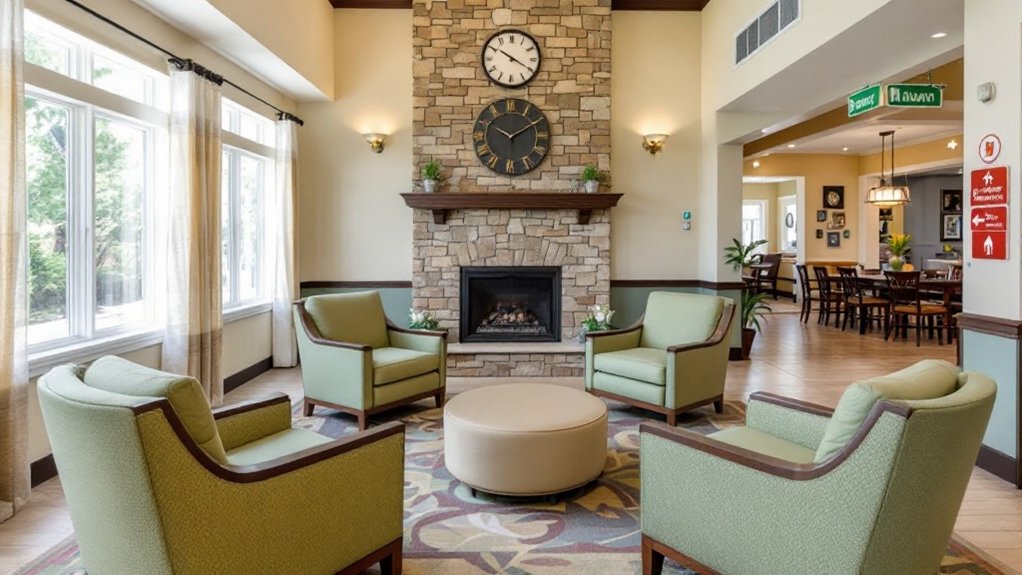Assisted living facilities offer extensive dementia support through structured daily assistance, cognitive engagement programs, and specialized safety protocols. You'll find medication management, grooming help, and nutritional monitoring alongside therapeutic activities designed to enhance cognitive function. The facilities feature dementia-friendly layouts, 24/7 staff availability, and emergency response systems, while providing healthcare coordination and transportation services. Exploring the full spectrum of memory care options reveals increasingly specialized levels of support.

The evolving landscape of assisted living facilities has emerged as a critical intermediate care solution for individuals with early-stage dementia, offering a delicate balance between independence and supportive services. Within these environments, you'll find thorough daily living assistance, including medication management protocols, personalized grooming support, and nutritional monitoring services that adapt to progressive cognitive decline while maintaining resident dignity.
The integration of structured activities and social engagement programs serves as a cornerstone of cognitive support, while dedicated staff members provide essential assistance with activities of daily living, including bathing, dressing, and mobility support. Structure and routine help create stability and familiarity for residents managing cognitive changes. Round-the-clock staff remain available to provide immediate assistance whenever needed.
You'll discover that these communities implement emergency response systems and safety protocols specifically designed to address the unique challenges faced by residents with cognitive impairments, though the level of specialized care remains less intensive than memory care units. Facilities prioritize personalized care plans to ensure each resident receives tailored support for their unique needs and challenges.
In examining the environmental adaptations, you'll note that assisted living facilities incorporate specific design elements to support orientation and reduce confusion, while maintaining a less restrictive atmosphere compared to memory care settings. The communities typically offer private or semi-private living spaces equipped with safety features, alongside communal dining areas that facilitate social interaction and supervised nutrition intake.
The healthcare service integration within assisted living encompasses regular nurse visits, coordination of medical appointments, and transportation services, ensuring consistent monitoring of residents' cognitive and physical health status.
You'll find that while staff members receive basic dementia care training, the level of specialized expertise may not match that found in dedicated memory care facilities, necessitating potential changes as cognitive decline progresses.
The financial framework for accessing these services typically involves a combination of private pay options and, depending on your state's regulations, potential Medicaid coverage for specific services.
You'll observe that communities maintain established protocols for evaluating residents' ongoing care needs, implementing change plans when more intensive memory care becomes necessary, ensuring continuous appropriate care delivery throughout the progression of dementia symptoms.
Frequently Asked Questions
How Much Does Dementia Care Typically Cost per Month in Assisted Living?
You'll typically pay around $4,000 monthly for dementia care in assisted living facilities across the U.S., though costs can range substantially from $2,500 to $10,000 depending on your location and required level of care.
Urban areas and facilities with enhanced amenities command premium rates, while rural locations tend to be more affordable.
Staff-to-resident ratios, specialized training programs, and safety features also influence your monthly expenses.
Can Couples Stay Together if Only One Spouse Has Dementia?
Yes, you can keep living with your spouse in most assisted living facilities, even if only one of you has dementia.
Many communities offer "split-care" arrangements, where each resident receives individualized services based on their specific needs.
You'll find options ranging from shared apartments in assisted living to specialized units where one spouse can access memory care while maintaining proximity to their partner in independent living.
What Are the Signs That Indicate It's Time for Assisted Living?
You'll need to evaluate shifting to assisted living when multiple risk factors converge: significant cognitive decline manifesting through missed medications or bills, compromised safety evidenced by wandering or unexplained injuries, social withdrawal from previously enjoyed activities, and caregiver burnout characterized by exhaustion and declining ability to provide adequate care.
Progressive dementia symptoms, combined with increasing safety concerns and caregiver stress, typically indicate professional care is necessary.
Do Medicare or Medicaid Cover Assisted Living Costs for Dementia Patients?
Medicare won't cover your assisted living costs since it considers them custodial care, though it will cover specific medical services like diagnostic tests and skilled nursing.
You'll need to explore Medicaid coverage, which may fund assisted living if you meet strict income and asset requirements.
Alternative funding options include private payment, veteran benefits, long-term care insurance, or life plan communities with bundled care packages.
What Is the Average Length of Stay in Memory Care Facilities?
The average length of stay in memory care facilities typically ranges from 2 to 10 years, with significant variation based on your loved one's specific condition and circumstances.
You'll find that Alzheimer's patients generally experience longer stays, while those with rapidly progressing conditions like Creutzfeldt-Jakob disease have shorter durations.
Your family member's overall health status, comorbidities, and level of cognitive decline will directly influence their length of stay.









